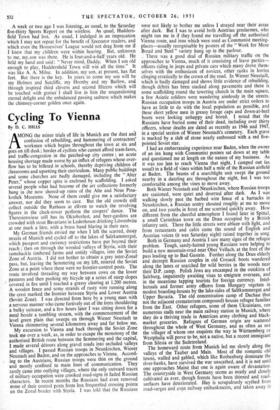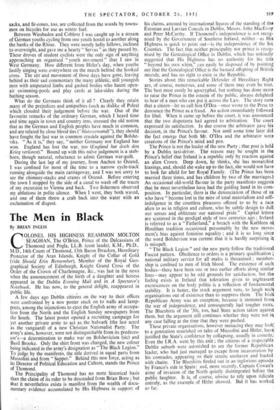Cycling To Vienna
By D. C HILLS MONG the minor trials of life in Munich are the dust and confusion of rebuilding, and hammering of contractors' workmen which begins throughout the town at six and goes on till dusk ; hordes of cyclists who cannot afford tram-fares, and traffic-congestion in the patched-up city centre ; an acute housing shortage made worse by an influx of refugees whose over- flow has to be billeted in schools, thereby depriving children of classrooms and upsetting their curriculum. Many public buildings and some churches are badly damaged, including the " Alter Peter," whose copper spire is enclosed by scaffolding. I asked several people what had become of the art collections formerly hung in the now shored-up ruins of the Alte and Neue Pina- kothek Museums. None of them could give me a satisfactory answer, nor did they seem to care. But the old crowds still collect outside the Rathaus at eltven to watch the revolving figures in the clock-tower perform the coopers' dance. The Theresienwiese still has its Oktoberfest, and beer-gardens are crowded with stout Bavarians in Lederhosen drinking Lowenbrau at one mark a litre, with a brass band blaring in their ears.
My German friends envied me when I left the scarred, dusty streets of Munich and cycled off to the lakes of Salzkammergut, which passport and currency restrictions have put beyond their reach ; then on through the wooded valleys of Styria, with their ramshackle timbered farms and untidy villages, into the Soviet Zone of Austria. I did not bother to obtain a.grey inter-Zonal- pass, but, leaving the Semmering on my left, entered the Soviet Zone at a point where there were no frontier-control posts. The route involved threading my way between cow on the lower pastures and then pushing my bicycle up a series of steep slopes covered in firs until I reached a grassy clearing at 1,200 metres. A wooden fence and some strands of rusty wire running along the crest marked the frontier between Styria and Lower Austria (Soviet Zone). I was directed from here by a young man with a nervous manner who came furtively out of the trees shouldering a bulky suitcase, and a few hours later I was sitting down for a meal beside a tumbling stream, with the commencement of the level green plain that sweeps on through Wiener Neustadt to Vienna shimmering several kilometres away and far below me. My excursion to Vienna and back through the Soviet Zone took me over a week, as, in order to escape the monotony of the authorised British route between the Semmering and the capital, . I made several detours along gravel roads into secluded valleys and villages. I passed Russian troops in Neunkirchen, Wiener Neustadt and Baden, and on the approaches to Vienna. Accord- , ing to the Austrians, Russian troops were thin on the ground and mostly confined to main lines of communication. They rarely came into outlying villages, where the only outward traces of military occupation were crooked road-signs in faded Russian characters. In recent months the Russians had even removed Some of their control posts from less frequented crossing points on the Zonal border with Styria. I was told that the Russians were not likely to bother me unless I strayed near their areas after dark. But I was to avoid both Atistrian gendarmes, who might run me in if they found me travelling off the authorised Vienna route, and inns which were used as Communist meeting- places—usually recognisable by posters of the " Work for More Bread and Steel " variety hung up in the parlour. _ There was a good deal of Russian military traffic on the approaches to Vienna, much of it consisting of leave parties— officers riding in jeeps and private cars which many drove them- selves with the enthusiasm of novices, other- ranks in lorries clinging erratically to the crown of the road. In Wiener Neustadt, which is badly damaged and shows little evidence of rebuilding, though debris has been stacked along pavements and there is some scaffolding round the towering church in the main square, a few Asiatic soldiers were wandering aimlessly in the streets. Russian occupation troops in Austria are under strict orders to have as little to do with the local population as possible, and these short yellow men in greasy forage caps and down-at-heel boots were looking' unhappy and bored. I noted that the Russians have buried some of their dead, including over thirty officers, whose deaths are dated as recently as 1946 and 1947, in a special section of Wiener Neustadt's cemetery. Each grave is marked by a slab of stone neatly embossed with a red five- pointed Soviet star.
I had an embarrassing experience near Baden, when the owner of an inn hung with Communist posters sat down at my table and questioned me at length on the nature of my business. As it was too late to reach Vienna that night, I camped' out (as usual) in a field of vines within half a mile of the Russian airfield at Baden. The beams of a searchlight unit swept the ground nearby in a dazzling arc throughout the night, but I was too comfortable among the vines to move away.
Both Wiener Neustadt and Neunkirchen, where Russian troops are stationed, were quiet and deserted after dark. As I was walking slowly past the barbed wire fence of a barracks in Neunkirchen, a Russian sentry shouted roughly at me to move on, and two youths in front of me scurried quickly away. How different from the cheerful atmosphere I found later in Spittal, a small Carinthian town on the Drau occupied by a ,British infantry unit. There the little streets were ablaze with light, and from restaurants and cafés came the sound of English and Austrian voices (it was Saturday night) raised together in song.
Both in Germany and Austria I saw many signs of the refugee problem. Tough, sandy-haired young Russians were helping to build a new mountain-road near Ober Vellach, at the foot of the pass leading up to Bad Gastein. Further along the Drau elderly and decrepit Russian couples in old Cossack boots wandered along the lanes or searched for wild berries in the woods near their D.P. camp. Polish Jews are encamped in the outskirts of Salzburg, iinpatiently awaiting visas to emigrate overseas, and in the meantime tapping tourists for foreign currency. Intel- lectuals and former army officers from Hungary vegetate in modest boarding-houses by the lake-sides of Saltkammergut and Upper Bavaria. The old concentration camp of Dachau. (but not the adjacent crematorium compound) houses refugee families from the East. Other refugees, some of them Ukrainians, run numerous stalls near the main railway station in Munich,' where they do a thriving trade in American army clothing and black- market groceries. Refugees of German origin are scattered throughout the whole of West Germany, and as often as not the villager of whom one enquires the way in Wiirttemberg or Westphalia will prove to be, not a native, but a recent immigrant from Silesia or the Sudetenland.
The homeward route from Munich led me slowly along the valleys of the Tauber and Main. Most of the romantic old towns, walled and gabled, which like Rothenburg dominate the river-banks, have survived the war unscathed, and it is not until one approaches Mainz that one is again aware of devastation. The countryside in West Germany seems as neatly and closely cultivated as ever, though forests have been thinned and road- surfaces have deteriorated. Hay is scrupulously scythed from road-verges and even railway embankments, and taken away in sacks, and fir-cones, too, are collected from the woods by towns- men on bicycles for use as winter fuel.
Between Wiesbaden and Coblenz I was caught up in a stream of German youths cycling from one youth hostel to another along the banks of the Rhine. They were mostly hefty fellows, inclined to overweight, and gave me a hearty " Servus " as they passed by. These droves of student cyclists were the only sign of anything approaching an organised " youth movement" that I saw in West Germany. How different from Hitler's day, when youths lustily singing were everywhere on the march behind the hooked cross. The stir and movement of those days have gone, leaving behind as their sad commentary the many athletic, still youngish men with amputated limbs and gashed bodies who haunt open- air swimming-pools and play cards at lake-sides during the bathing season.
What do the Germans think of it all ? Clearly they retain many of the prejudices and antipathies (such as dislike of Poles) which clouded their judgement before the war. One of the favourite remarks of the ordinary German, which I heard time and time again in town and country inns, stressed the old notion that as the German and English peoples have much in common, and are related by close blood ties ("blutsverwandt"), they should have fought the last war in common crusade against the Bolshe- viks. " As it is," they say, " neither Germany nor England has won. England has lost the war, too (England hat doch den Krieg verloren)." Bound up with this naive judgement is a stub- born, though natural, reluctance to admit German war-guilt.
During the last lap of my journey, from Aachen to Ostend, I was confined for most of the. time to a narrow cycle-track running alongside the main carriageway, and I was not sorry to see the chimney-stacks and cranes of Ostend. Before entering the town I stopped by the side of a canal to wash off the traces of my excursion to Vienna and back. Two fishermen observed my ablutions in polite silence. When I went, they both waved, and one of them threw a crab back into' the water with an exclamation of disgust.



































 Previous page
Previous page